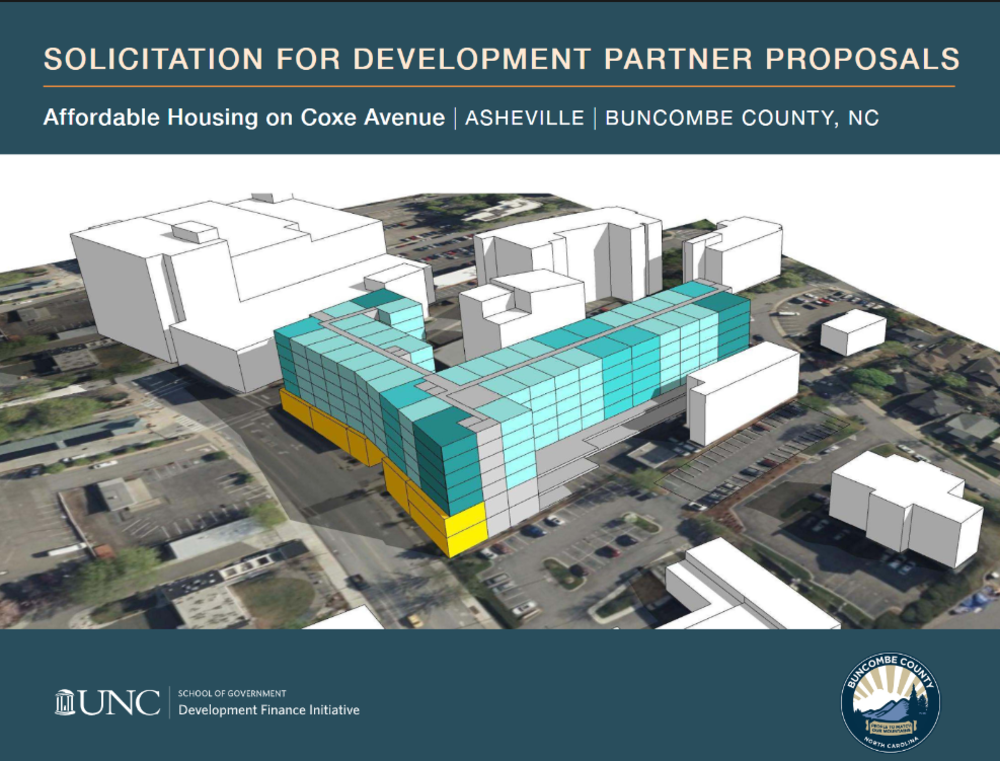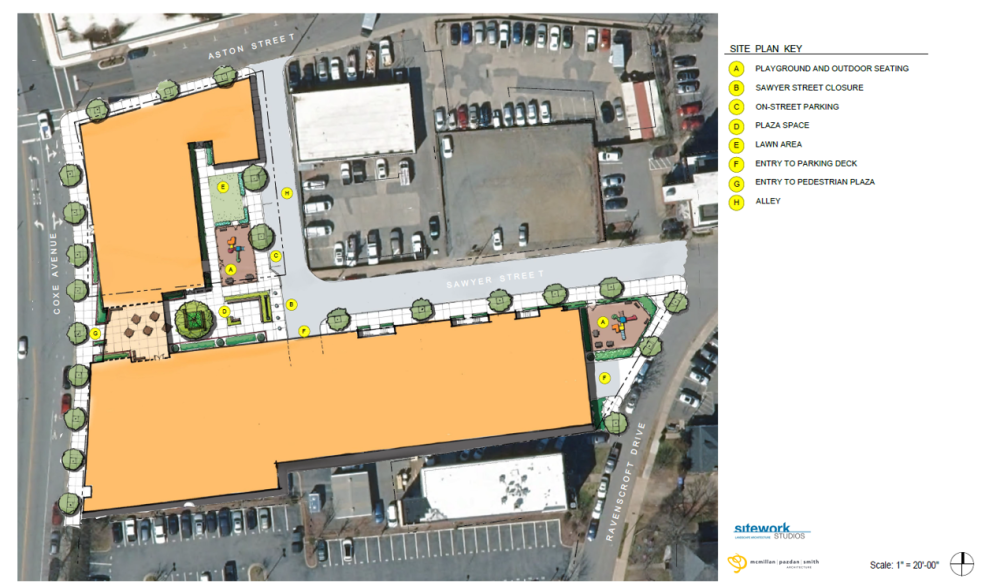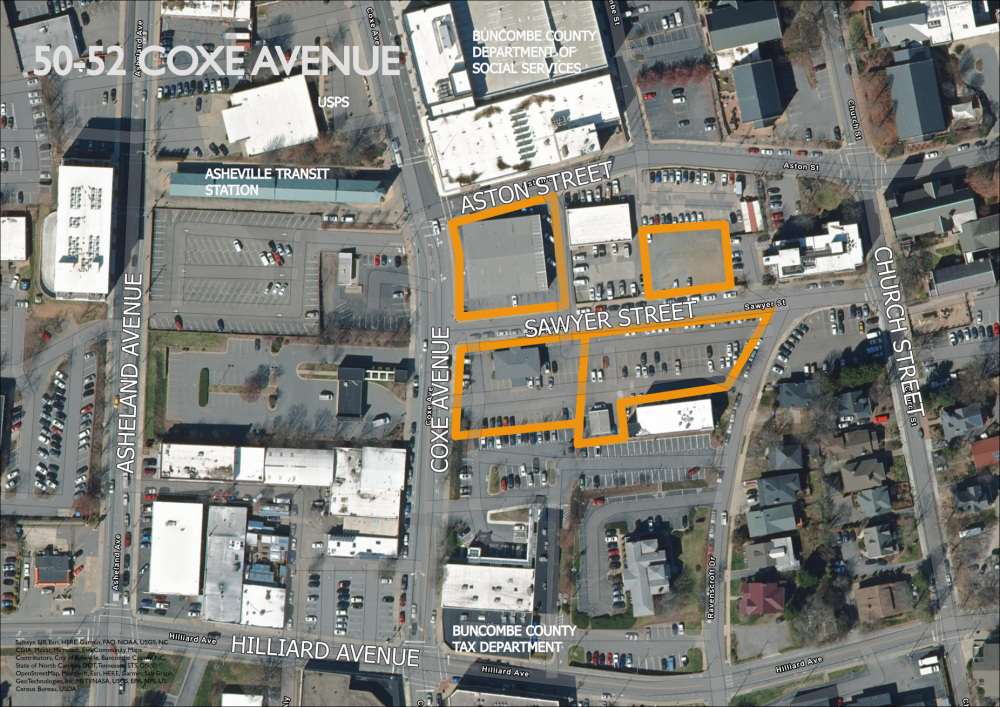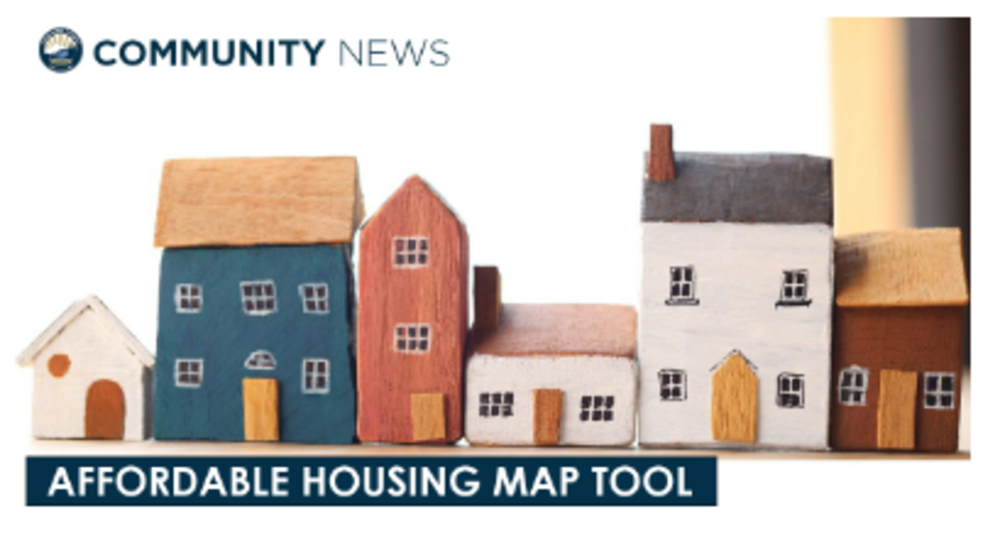Pursuing Affordable Housing on County-Owned Sites
Pursuing Affordable Housing on County-Owned Sites
Buncombe County is taking steps to convert underutilized County-owned properties into affordable housing. In March 2023, following the results of an initial evaluation of multiple properties, the Buncombe County Board of Commissioners prioritized three sites for potential development of affordable housing: 30-80 Valley Street, 50-52 Coxe Avenue, 180 Erwin Hills Road (portion). With the potential sites selected, the County invites community members and neighbors to participate in a series of community meetings to help determine the future of these affordable housing developments.
Learn more about the potential sites, project details, and get involved using the meetings tab above.
To take the Coxe Avenue Community input survey, click here.

Developer Selected
Harmony Housing Affordable Development Inc.: This rendering is for conceptual purposes only and does not represent final designs, approvals, or construction details. Elements depicted are subject to change based on further review, regulatory requirements, and project development.
In a move that will advance affordable housing, the Buncombe County Board of Commissioners approved entering negotiations for a Memorandum of Understanding with Harmony Housing during its regular meeting on March 18. Between July and September 2024, County staff reviewed nine developer proposals and recommended Harmony Housing.The nonbinding agreement would set the stage for Harmony Housing to be a development partner in turning county-owned properties at 50-52 Coxe Ave. into 206 affordable housing units.
Harmony Housing was selected because of its focus on maximizing multi-family units, parking, commercial integration, and other factors. The goal is to create 1-, 2-, and 3-bedroom units all designated at 80% or less of area median income. Harmony Housing demonstrated alignment with the guiding public interests generated through public feedback and illustrated its qualifications, relevant experience, and ability to deliver in a timely manner. No specific timeline for breaking ground has been established yet, but the memorandum of understanding outlines the responsibilities of establishing milestones for the project.
“This is a very exciting project we've been working on for quite some time,” said Commissioner Terri Wells. “We know how desperately our community needs more housing and especially more housing that people can afford.”
The proposed milestone schedule estimates that groundbreaking will occur in early 2027 and that construction could be completed as early as 2029.
View the full presentation here. Currently there are multiple County-owned properties that are slated to be turned into affordable housing. For more information on the memorandum of understanding, click here.
Harmony Housing Affordable Development Inc.: This rendering is for conceptual purposes only and does not represent final designs, approvals, or construction details. Elements depicted are subject to change based on further review, regulatory requirements, and project development.
Solicitation Period Now Open
Buncombe County, with support from the Development Finance Initiative (DFI), is now solicitating proposals from prospective development teams. The County seeks an experienced development partner to realize the private development of at least 200 LIHTC rental units and 5,900 square feet of non-residential space located on 1.6 acres of land at 50 and 52 Coxe Avenue in downtown Asheville, NC.
For information, contact Sarah Odio at odio@sog.unc.edu or Buncombe County Procurement to learn more.
At its April 2 meeting, the Board of Commissioners voted to move forward developing affordable housing on County-owned properties at 50 and 52 Coxe Avenue in downtown Asheville. With 200 proposed units, the estimated construction cost comes in at $59.1 million. Units are designated at 80% or less of area median income. The current area median household income is $68,019.
The proposal comes after more than 120 community members provided input on two possible development options through in-person and virtual opportunities. The other option included a reduced footprint that only utilized the property at 50 Coxe Avenue for 130 units.
Partnering with the UNC School of Government Development Finance Initiative (DFI), the Board of Commissioners determined the development should:
Maximize the number of new apartments affordable to low- and moderate-income households in a mixed income setting.
Include active ground floor uses that serve residents and commuters and increase pedestrian traffic along Coxe Avenue.
Maintain direct and safe access from Coxe Avenue to Church Street for pedestrians and cyclists.
Balance maximum density and pedestrian-scale design that extends the vibrant, urban streetscape from Patton Avenue to the South Slope area.
Attract as much private investment as possible to maximize the impact of public investment in affordable housing.
With the approval, the County will begin soliciting development partner(s) and negotiating agreements. Construction on the property is tentatively slated to begin early in 2026.
Additionally, the County is now seeking right-of-way closure for Sawyer Street through the City of Asheville's Technical Review Committee. The Sawyer Street closure would allow for the construction of more affordable housing units and the completion of a pedestrian pass through.
A bird's-eye view of Option 2 requires the closure of Sawyer Street and supports pedestrian access.
Subscribe to this page for updates and additional opportunities for engagement using the sign up in the right sidebar or at the bottom of the page on mobile devices.
Coxe Avenue Affordable Housing Development Community Engagement Meeting Summary Video
Background
Buncombe County is continuing its work to transform underused County-owned properties into affordable housing. The County hired the Development Finance Initiative (DFI) at UNC Chapel Hill’s School of Government in September 2022 to help meet the County’s goal to deliver at least 1,500 affordable rental units for low- and moderate-income households by 2030.
In March 2023, following the results of an initial evaluation of publicly-owned properties, the Buncombe County Board of Commissioners prioritized 50-52 Coxe Avenue for development. DFI then began a pre-development process to identify public interests specific to this location. Those interests were then used to guide the development of conceptual plans that meet market needs, are compatible with the site and neighboring uses, and will stretch limited public resources by attracting private funding.
Once a preferred plan is selected, the County will lead a competitive process to identify a qualified private development partner for each project. Development of the sites will occur only once important agreements that secure the public interests are executed between the County and its development partner(s).
Guiding Public Interests
In the first series of meetings with community members, Buncombe County worked with DFI to identify public interests specific to the site in order to guide development. A memo summarizing the feedback heard is available here. The following public interests were endorsed by the Buncombe County Board of Commissioners in August of 2023:
Development of the 50-52 Coxe Avenue site should:
- Maximize the number of new apartments affordable to low- and moderate-income households in a mixed income setting.
- Include active ground floor uses that serve residents and commuters and increase pedestrian traffic along Coxe Avenue.
- Maintain direct and safe access from Coxe Avenue to Church Street for pedestrians and cyclists.
- Balance maximum density and pedestrian-scale design that extends the vibrant, urban streetscape from Patton Avenue to the South Slope area.
- Attract as much private investment as possible in order to maximize the impact of public investment in affordable housing.
DFI worked with the architecture firm McMillan Pazdan Smith (MPS) to explore the various ways the property could be developed given the public interests, physical site limitations, and local regulations. MPS created multiple plans including options with more or less residentials units of various designs and heights with commercial uses on the first floor. DFI then estimated the total construction cost for each scenario and estimated the sources of debt and equity funding that the private partner would likely be able to secure. With any development that restricts rents to keep those rents affordable, a funding gap is likely to exist once private or non-charitable sources, including Low-Income Housing Tax Credit equity, are exhausted. The County’s potential investment in any project will be to fill the funding gap for the development of units that are reserved for low- and moderate-income households.
Community Meetings
Coxe Avenue Property Community Engagement Meeting
This meeting will be live streamed to this site.
- Fact Sheet_Coxe Avenue_January 2024.docx
- Feedback Form_Coxe Avenue Input_February 2024_Final.docx
- Coxe Avenue Input_Feedback Form_Feb 2024_Spanish.docx
- Buncombe County_Coxe Avenue_Community Input_Feb 2024_1.pptx
- Buncombe County_Coxe Avenue_Community Input_Feb 202_1
- Buncombe County_Coxe Avenue_Community Input_Feb 2024 (1)_2.pdf
Coxe Avenue Property Online Community Engagement Meeting
Make sure to register for this event to receive the online meeting information.
Thanks for your interest! Registration is closed because the event has concluded.
Watch: Tapped In Episode: Housing Matters
with Buncombe County's Community Development Division Manager Matt Cable who shares more about affordable housing initiatives and how the community can get involved.
Do You Qualify for Housing Services in Buncombe County?
Determining household income is the first step in qualifying for housing services. Many housing services use income caps, based on federal Area Median Income (AMI) data, to ensure they help people who need the most assistance. Click here to use our AMI Calculator to see if you qualify for the needed program.





